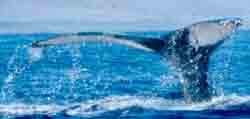Left Column Top
Left Column Bottom
Right Column
Humpback Whales

Humpback Whale Facts:
Scientific name: Megaptera novaeangliae
Humpback whales are majestic and mysterious creatures; not to mention LARGE! An average adult can be as long as 50 feet and weigh between 34-45 tons. That is an average of 70,000 pounds, which is the weight of two and a-half school busses. Humpback whales spend winter in the Northern Hemisphere feeding on the abundant krill available in the cold water. During the winter months they migrate south to warmer waters where cows (female whales) usually give birth to their calves. At birth, a calf can weigh 1.5 tons and measure 15 feet in length! A calf will nurse from its mother for about 11 months and during this time it can double in size.
Whale Songs
One unique characteristic of the
humpback whale is its production of sounds, also considered social
vocalizations. Both male and female whales produce vocal sounds. However, only
males appear to produce songs. They can sing complex and extensive songs that
can last up to 20 minutes, be heard for a 20-mile radius and be repeated for
hours. Interestingly, males only produce the songs on breeding grounds.
Researchers believe they produce the music by circulating air through the tubes
and chambers of their respiratory system. However, they are unsure why the male
humpback whale produces songs. Two prevailing ideas are that the songs are
either a mating call to females or a warning or challenge to other males in the
breeding area
To hear recorded humpback whale songs, visit the following National Oceanic and Atmospheric
Association websites:
• VENTS Program
• Hawaiian Islands Humpback Whale National Marine Sanctuary
The information provided is meant to be a brief insight into the world of the Humpback whale. For more detailed information and extensive resources, visit your local library or research humpback whales on the Internet.
Humpback Whale Related Web Sites
Hawaiian Islands Humpback Whale National Marine Sanctuary -You'll find scientific, cultural, and educational resources on humpback whales and their Hawaiian habitat.
Hawaii
Whale Research Foundation -This
comprehensive web site is full of information on the natural history of
the humpback whale, with emphasis on North  Pacific humpbacks in the Hawaiian islands.
Pacific humpbacks in the Hawaiian islands.
Voices in the Sea - This website from Scripps Institute of Oceanography includes sound clips and video of many species of whales and other marine mammals, as well as interviews with scientists and conservationists.
NOAA Fisheries Office of Protected Resources -This page provides a detailed description of humpback whales and includes links to relevant federal regulatory documents.
Whale Net - An interactive educational web site which focuses on whales and marine research
The
Curious Humpback - PBS’s Nature on the WEB
Resources, includes general information about humpback whales.
